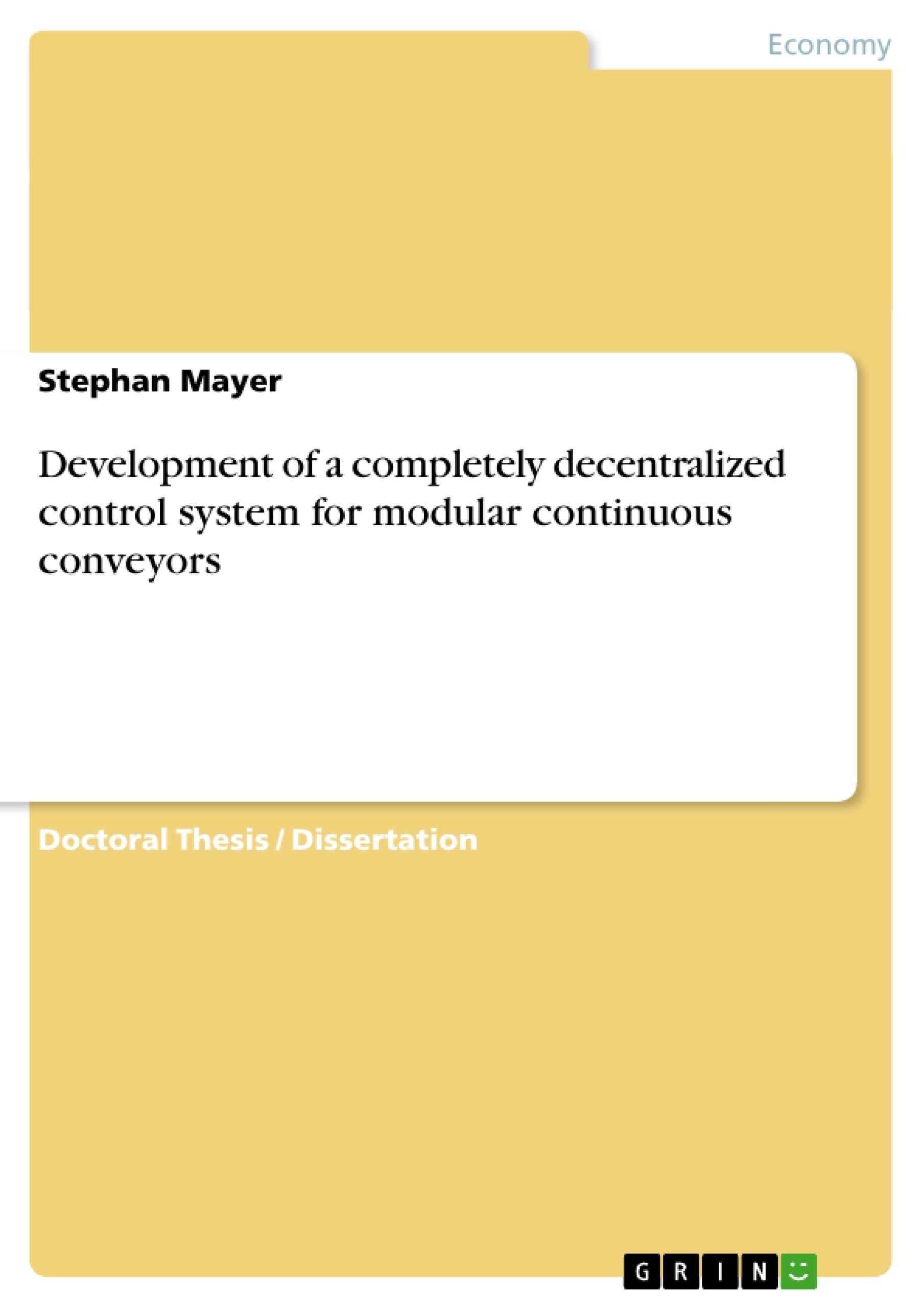To increase the flexibility of application of continuous conveyor systems, a completely decentralized control system for a modular conveyor system is introduced in the paper. This system is able to carry conveyor units without any centralized infrastructure. Based on existing methods of decentralized data transfer in IT networks, single modules operate autonomously and, after being positioned into the required topology, independently connect together to become a functioning conveyor system. Parallel to the development of the decentralized control system, identical square modules were developed, which in a compact unit contain all of the features necessary to function as a switch, junction or linear conveyor section. To fulfill this task, every module is equipped with an RFID identification system, sensors, a multi-directional drive, and a microcontroller-based control unit that executes the control algorithm.
The following functions can be performed by these modules with the help of the innovative control algorithm:
• Independent generation of the topological map in the form of routing tables
• Recognition of an incoming conveyor unit and identification of the destination address
• Planning of the path to the destination taking into consideration conveyor units already located in the system
• Protection against collisions and deadlocks, and transportation of the conveyor unit to the next module
• Autonomous regulation of the injection rate to ensure the highest possible throughput
The throughput performance of the control algorithm developed here was analyzed by simulating representative topologies. Furthermore, it was proven that under certain conditions, despite the conveyor routes being used in multiple directions, a situation can never arise where conveyor units block each other and the flow of material comes to a halt in the form of a deadlock.
Inhaltsverzeichnis (Table of Contents)
- Einleitung
- Stand der Technik
- Modulare Fördertechnik
- Dezentrale Steuerungssysteme
- Anforderungen an ein dezentrales Steuerungssystem
- Funktionalitäten
- Kommunikationsstrukturen
- Sicherheit und Zuverlässigkeit
- Konzept eines dezentralen Steuerungssystems
- Systemarchitektur
- Steuerungsebene
- Feldebene
- Implementierung des Steuerungssystems
- Hardwarekomponenten
- Softwareentwicklung
- Inbetriebnahme und Test
- Bewertung und Diskussion
- Funktionalität und Leistung
- Kosten und Wirtschaftlichkeit
- Sicherheit und Zuverlässigkeit
- Zusammenfassung und Ausblick
Zielsetzung und Themenschwerpunkte (Objectives and Key Themes)
This dissertation investigates the development of a completely decentralized control system for modular continuous conveyors. The main objectives are to:- Analyze the requirements and challenges of implementing a decentralized control system for modular conveyors.
- Develop a comprehensive concept for a decentralized control system architecture that addresses the identified requirements.
- Implement and validate the proposed control system in a real-world application.
- Evaluate the performance, cost-effectiveness, and reliability of the developed system.
- Modular conveyor technology and its advantages.
- Decentralized control systems and their application in industrial automation.
- Communication protocols and data exchange between control system components.
- System design and integration of hardware and software components.
- Performance evaluation and optimization of decentralized control systems.
Zusammenfassung der Kapitel (Chapter Summaries)
- Einleitung: This chapter introduces the research topic and provides an overview of modular continuous conveyors and decentralized control systems. It highlights the advantages and challenges associated with decentralized control systems in this context.
- Stand der Technik: This chapter reviews existing technologies and approaches related to modular conveyor systems and decentralized control systems. It examines various types of modular conveyors, existing control systems, and relevant communication protocols.
- Anforderungen an ein dezentrales Steuerungssystem: This chapter defines the specific requirements for a decentralized control system for modular continuous conveyors. It addresses functional, communication, safety, and reliability aspects.
- Konzept eines dezentralen Steuerungssystems: This chapter presents the developed concept for a decentralized control system architecture, including the system architecture, control level, and field level.
- Implementierung des Steuerungssystems: This chapter describes the implementation of the control system, covering hardware components, software development, and commissioning and testing procedures.
- Bewertung und Diskussion: This chapter analyzes the functionality, performance, cost-effectiveness, and reliability of the developed control system. It discusses the advantages and limitations of the proposed solution.
Schlüsselwörter (Keywords)
This research explores key concepts related to modular continuous conveyors, decentralized control systems, system architecture, communication protocols, hardware and software integration, performance evaluation, and reliability analysis. The work is focused on developing a practical solution for implementing a decentralized control system that addresses the specific requirements of modular conveyor technology in an industrial automation setting.Frequently Asked Questions
What is a completely decentralized control system for conveyors?
It is a system where individual conveyor modules operate autonomously without a central server, connecting independently to form a functioning topology.
How do the modules identify conveyor units?
Each module is equipped with an RFID identification system, sensors, and a microcontroller to identify and route units to their destination.
How does the system prevent deadlocks?
The control algorithm includes specific logic for collision protection and path planning to ensure that material flow never comes to a halt, even with multi-directional routes.
What are the advantages of modular conveyor technology?
Modular systems offer high flexibility, as modules can function as switches, junctions, or linear sections and can be easily reconfigured.
How is the throughput performance of the algorithm analyzed?
The performance was validated through simulations of representative topologies and real-world implementation tests.
- Quote paper
- Dr.-Ing. Stephan Mayer (Author), 2009, Development of a completely decentralized control system for modular continuous conveyors, Munich, GRIN Verlag, https://www.grin.com/document/132541



